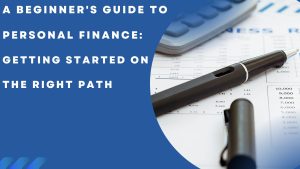Managing money effectively is a crucial skill that can positively impact our lives in numerous ways. It allows us to achieve financial stability, reduce stress, and work towards our long-term goals. At the core of financial control lies budgeting, which serves as a blueprint for managing our income and expenses.
In this comprehensive blog post, we will explore the importance of budgeting, understand its significance in money management, and delve into various strategies to help you take control of your finances.
Understanding Money Management and Budgeting
A solid understanding of money management and budgetin is important. With This you lay the foundation for taking control of your finances.
What is money management?
Money management refers to the process of efficiently and effectively handling one’s financial resources. It involves making informed decisions about earning, saving, spending, and investing money. By practicing good money management, individuals can achieve financial security, build wealth, and pursue their desired lifestyle.
What is budgeting and its significance?
Budgeting is a fundamental component of money management. It involves creating a detailed plan that outlines our expected income and allocates funds to various expenses and savings goals. A budget provides us with a clear overview of our financial situation, enabling us to make informed decisions, avoid overspending, and prioritize our financial goals.
Benefits of effective money management and budgeting
Effective money management and budgeting offer numerous benefits. They empower individuals to:
- Gain a sense of control: By having a budget in place, individuals gain a sense of control over their finances. They know where their money is coming from, where it is going, and how it aligns with their goals.
- Reduce financial stress: A well-managed budget helps alleviate financial stress. By having a clear plan, individuals can avoid living paycheck to paycheck and handle unexpected expenses without significant disruptions.
- Achieve financial goals: Budgeting allows individuals to set and work towards financial goals. Whether it’s saving for a dream vacation, buying a home, or retiring comfortably, a budget serves as a roadmap for turning aspirations into reality.
Assessing Your Current Financial Situation
Thoroughly assessing your current financial situation, including your income sources, expenses, and spending habits, you gain valuable insights into your financial landscape. This awareness sets the stage for creating a budget that reflects your financial realities and helps you make informed decisions moving forward.
Analyzing income sources and amounts
To begin taking control of your finances, start by analyzing your income sources. This includes your salary, side hustles, investments, or any other means of generating income. Make a comprehensive list of all your income sources and calculate the total amount you earn each month.
Evaluating monthly expenses and identifying patterns
Next, evaluate your monthly expenses. Categorize them into fixed expenses (such as rent or mortgage payments) and variable expenses (such as groceries or entertainment). Identify any recurring patterns or trends in your spending habits. This analysis will help you understand where your money is going and highlight potential areas for improvement.
Tracking spending habits and identifying areas for improvement
Tracking your spending habits is crucial for effective budgeting. Utilize online banking tools, mobile apps, or financial software to monitor your expenses accurately. Identify areas where you can make adjustments and cut back on unnecessary spending. This process will enable you to optimize your budget and align it with your financial goals.
Creating a Budget Plan
Creating a budget plan provides a roadmap for managing your finances and achieving your financial goals. By setting clear goals, allocating funds for essential expenses, and determining discretionary spending limits, you establish a framework that allows you to make informed financial decisions and maintain control over your money.
Setting financial goals
Before creating a budget plan, it’s essential to set clear financial goals. These goals could include paying off debt, saving for retirement, building an emergency fund, or any other aspirations you have. By setting specific, measurable, achievable, relevant, and time-bound (SMART) goals, you can tailor your budget to align with your objectives.
Allocating funds for essential expenses
Allocate funds for essential expenses, such as housing, utilities, transportation, groceries, and healthcare. These are non-negotiable expenses that must be accounted for in your budget. Prioritize these expenses based on their importance and ensure they are covered before allocating funds to other categories.
Determining discretionary spending limits
Discretionary spending refers to non-essential expenses, such as dining out, entertainment, or hobbies. Set realistic limits for these discretionary categories, considering your financial goals and income. It’s important to strike a balance between enjoying your money and saving for the future. By setting limits, you can enjoy guilt-free spending within your means.
Essential Strategies for Effective Money Management
These are additional strategies essential for effective money management and budgeting. prioritizing expenses, implementing the 50/30/20 rule, and utilizing the envelope budgeting system,
Prioritizing expenses and needs vs. wants
When managing your money, it’s crucial to differentiate between needs and wants. Prioritize essential expenses, such as housing, food, and healthcare, over discretionary purchases. By focusing on needs first, you ensure that your basic necessities are met before indulging in wants.
Implementing the 50/30/20 rule for budgeting
The 50/30/20 rule is a popular budgeting guideline. It suggests allocating 50% of your income to essential expenses, 30% to discretionary spending, and 20% to savings and debt repayment. This rule provides a balanced approach to budgeting, ensuring you meet your immediate needs, enjoy some discretionary spending, and save for the future.
Utilizing the envelope budgeting system for better control
The envelope budgeting system is a practical method to gain better control over your spending. Assign specific amounts of cash to different categories, such as groceries or entertainment, and place the cash in separate envelopes. Once an envelope is empty, you cannot spend any more money in that category until the next budgeting period. This system promotes conscious spending and helps you stay within your budget limits.
Practical Tips to Save Money
Here are some practical tips to save money. With these you can significantly reduce your monthly expenses and increase your savings. By cutting back on unnecessary expenses, comparison shopping, and implementing strategies to reduce utility bills, you’ll have more control over your spending and be able to allocate your resources towards your financial goals.
Cutting back on unnecessary expenses
To save money, it’s crucial to identify and cut back on unnecessary expenses. Evaluate your spending habits and look for areas where you can reduce costs. This could include dining out less frequently, canceling unused subscriptions, or negotiating better deals on services.
Comparison shopping and seeking out discounts
Before making any significant purchases, take the time to compare prices and seek out discounts or promotions. Online shopping platforms and price comparison websites can help you find the best deals. Additionally, consider using discount codes, coupons, or loyalty programs to maximize savings.
Strategies for reducing utility bills and saving on monthly costs
Reducing utility bills can significantly impact your monthly expenses. Adopt energy-saving practices, such as using energy-efficient appliances, turning off lights when not in use, and adjusting thermostat settings. Additionally, consider bundling services or negotiating lower rates with service providers to reduce recurring costs.
Managing Debt and Avoiding Financial Pitfalls
Managing debt and avoiding financial pitfalls is crucial for long-term financial well-being. By understanding the different types of debt, creating a debt repayment plan, and actively avoiding common financial pitfalls and impulse spending, you can regain control over your finances and work towards a debt-free future.
Understanding the different types of debt
It’s essential to understand the various types of debt and their implications on your finances. Differentiate between good debt (such as a mortgage or student loans) and bad debt (such as high-interest credit card debt). Prioritize paying off high-interest debt first to save on interest payments.
Creating a debt repayment plan
Develop a debt repayment plan to systematically eliminate your outstanding balances. Consider strategies such as the debt avalanche method (paying off the highest-interest debt first) or the debt snowball method (paying off the smallest debt first to build momentum). Stick to your plan and allocate a portion of your budget to debt repayment each month.
Avoiding common financial pitfalls and impulse spending
Financial pitfalls, such as impulse spending or emotional buying, can hinder your budgeting efforts. Avoid making impulsive purchases by implementing a cooling-off period before buying non-essential items. Reflect on your financial goals and consider whether the purchase aligns with your long-term plans.
Monitoring and Adjusting Your Budget
Monitoring and adjusting your budget are essential for maintaining financial control and ensuring your budget remains effective. By regularly reviewing your budget and financial goals, accurately tracking your expenses and income, and making necessary adjustments as circumstances change, you can stay on track with your financial plans and make informed decisions about your money.
Regularly reviewing your budgeting and financial goals
To ensure the effectiveness of your budget, regularly review it and monitor your progress towards your financial goals. Set aside time each month to assess your income, expenses, and savings. If necessary, make adjustments to your budget to accommodate changing circumstances or new financial goals.
Tracking expenses and income accurately
Accurate tracking of expenses and income is crucial for effective budgeting. Utilize budgeting apps, spreadsheets, or personal finance software to record your transactions. Stay vigilant about categorizing your expenses correctly to gain a clear understanding of your spending habits.
Making necessary adjustments to your budget as circumstances change
Life is dynamic, and circumstances can change. Be prepared to adjust your budget accordingly. If you experience a significant change in income, such as a raise or job loss, reassess your budget to accommodate the new financial situation. Flexibility is key to maintaining control over your finances.
Building an Emergency Fund
An emergency fund is a crucial step towards financial stability and preparedness. By understanding the importance of emergency funds, implementing strategies for saving and building your fund, and using it wisely when needed, you can safeguard yourself against unexpected financial hardships.
Importance of emergency funds for financial stability
An emergency fund serves as a financial safety net in times of unexpected expenses or emergencies. It provides peace of mind and helps you avoid accumulating debt when faced with unplanned financial burdens. Aim to build an emergency fund that can cover at least three to six months’ worth of essential expenses.
Strategies for saving and building an emergency fund
Building an emergency fund requires consistent saving. Allocate a portion of your budget specifically for savings. Consider automating regular contributions to your emergency fund to ensure consistent progress. Look for opportunities to reduce expenses and redirect the savings towards your emergency fund.
How to use your emergency fund wisely
When using your emergency fund, it’s important to exercise caution and use the funds for genuine emergencies only. Avoid tapping into your emergency fund for non-essential expenses or impulse purchases. Replenish the fund as soon as possible after withdrawing from it to maintain your financial security.
Investing and Growing Your Money
Investing and growing your money is a key component of achieving long-term financial success. By familiarizing yourself with basic investment concepts, considering the appropriate investment strategies for your goals, and seeking professional advice when needed, you can make informed investment decisions that align with your financial aspirations.
Introduction to basic investment concepts
Investing is a powerful tool for growing your wealth. Educate yourself about basic investment concepts such as stocks, bonds, mutual funds, and diversification. Understand the risk-reward tradeoff and seek professional advice if needed to make informed investment decisions.
Long-term vs. short-term investment strategies
Consider your financial goals and time horizon when developing an investment strategy. Long-term investments, such as retirement accounts or index funds, focus on steady growth over several years. Short-term investments, such as high-yield savings accounts or certificates of deposit (CDs), cater to shorter-term goals and provide more immediate liquidity.
Seeking professional advice for investment decisions
Investing can be complex, and seeking professional advice can provide valuable insights. Consider consulting with a certified financial planner or investment advisor to help you navigate the investment landscape and make informed decisions aligned with your financial goals.
Exploring Tools and Apps for Budgeting
By exploring budgeting tools and apps, choosing the right one for your needs, and maximizing their benefits, you can enhance your budgeting experience and gain better control over your finances.
Overview of popular budgeting tools and apps
Numerous budgeting tools and apps are available to assist in managing your finances effectively. Examples include Mint, YNAB (You Need a Budget), and Personal Capital. These tools offer features such as expense tracking, goal setting, and personalized financial insights.
How to choose the right budgeting tool for your needs
When selecting a budgeting tool, consider your specific needs and preferences. Evaluate the features and functionality of different tools to determine which aligns best with your financial goals. Read reviews, compare pricing plans, and try out free trials to find the tool that suits you best.
Maximizing the benefits of budgeting apps
To maximize the benefits of budgeting apps, use them consistently and integrate them into your daily financial routine. Regularly update your transactions, review insights provided by the apps, and leverage the tools available to track your progress towards your financial goals.
Overcoming Challenges and Staying Motivated
Financial setbacks can be discouraging, but they shouldn’t derail your budgeting journey. Stay resilient and adapt your budget to accommodate unexpected expenses or changes in circumstances. Seek support from friends, family, or financial communities to stay motivated during challenging times.
Strategies for staying motivated on your budgeting journey
Maintaining motivation is key to long-term success in budgeting. Set milestones along the way and celebrate your achievements. Find accountability partners or join online communities where you can share experiences, seek advice, and stay motivated. Remind yourself of the financial freedom and peace of mind that budgeting can bring.
Celebrating milestones and acknowledging progress
As you progress on your budgeting journey, celebrate milestones and acknowledge your progress. Whether it’s paying off a debt, reaching a savings goal, or consistently sticking to your budget, take the time to recognize your achievements. Reward yourself within reason, and use these milestones as motivation to continue improving your financial health.
Conclusion:
Budgeting is a powerful tool that empowers individuals to take control of their finances and achieve their financial goals. By understanding money management, assessing your financial situation, creating a budget plan, and implementing effective strategies, you can build a solid foundation for financial stability and success. Embrace the power of budgeting, and take the necessary steps to manage your money wisely. With determination, discipline, and the strategies discussed in this article, you can pave the way to a brighter financial future.







